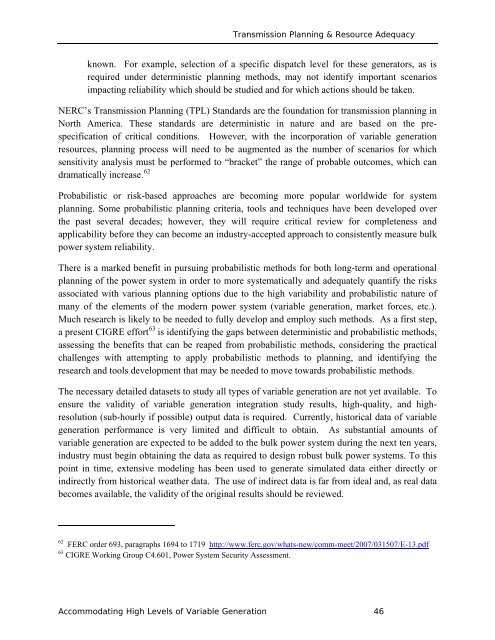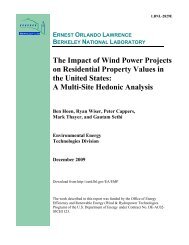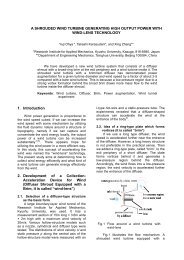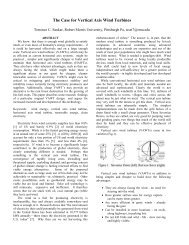Accommodating High Levels of Variable Generation - NERC
Accommodating High Levels of Variable Generation - NERC
Accommodating High Levels of Variable Generation - NERC
Create successful ePaper yourself
Turn your PDF publications into a flip-book with our unique Google optimized e-Paper software.
Transmission Planning & Resource Adequacy<br />
known. For example, selection <strong>of</strong> a specific dispatch level for these generators, as is<br />
required under deterministic planning methods, may not identify important scenarios<br />
impacting reliability which should be studied and for which actions should be taken.<br />
<strong>NERC</strong>’s Transmission Planning (TPL) Standards are the foundation for transmission planning in<br />
North America. These standards are deterministic in nature and are based on the prespecification<br />
<strong>of</strong> critical conditions. However, with the incorporation <strong>of</strong> variable generation<br />
resources, planning process will need to be augmented as the number <strong>of</strong> scenarios for which<br />
sensitivity analysis must be performed to “bracket” the range <strong>of</strong> probable outcomes, which can<br />
dramatically increase. 62<br />
Probabilistic or risk-based approaches are becoming more popular worldwide for system<br />
planning. Some probabilistic planning criteria, tools and techniques have been developed over<br />
the past several decades; however, they will require critical review for completeness and<br />
applicability before they can become an industry-accepted approach to consistently measure bulk<br />
power system reliability.<br />
There is a marked benefit in pursuing probabilistic methods for both long-term and operational<br />
planning <strong>of</strong> the power system in order to more systematically and adequately quantify the risks<br />
associated with various planning options due to the high variability and probabilistic nature <strong>of</strong><br />
many <strong>of</strong> the elements <strong>of</strong> the modern power system (variable generation, market forces, etc.).<br />
Much research is likely to be needed to fully develop and employ such methods. As a first step,<br />
a present CIGRE effort 63 is identifying the gaps between deterministic and probabilistic methods,<br />
assessing the benefits that can be reaped from probabilistic methods, considering the practical<br />
challenges with attempting to apply probabilistic methods to planning, and identifying the<br />
research and tools development that may be needed to move towards probabilistic methods.<br />
The necessary detailed datasets to study all types <strong>of</strong> variable generation are not yet available. To<br />
ensure the validity <strong>of</strong> variable generation integration study results, high-quality, and highresolution<br />
(sub-hourly if possible) output data is required. Currently, historical data <strong>of</strong> variable<br />
generation performance is very limited and difficult to obtain. As substantial amounts <strong>of</strong><br />
variable generation are expected to be added to the bulk power system during the next ten years,<br />
industry must begin obtaining the data as required to design robust bulk power systems. To this<br />
point in time, extensive modeling has been used to generate simulated data either directly or<br />
indirectly from historical weather data. The use <strong>of</strong> indirect data is far from ideal and, as real data<br />
becomes available, the validity <strong>of</strong> the original results should be reviewed.<br />
62 FERC order 693, paragraphs 1694 to 1719 http://www.ferc.gov/whats-new/comm-meet/2007/031507/E-13.pdf<br />
63 CIGRE Working Group C4.601, Power System Security Assessment.<br />
<strong>Accommodating</strong> <strong>High</strong> <strong>Levels</strong> <strong>of</strong> <strong>Variable</strong> <strong>Generation</strong> 46
















